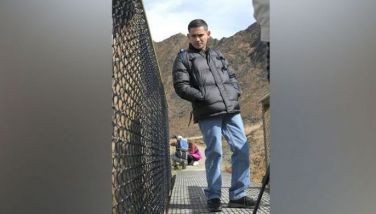Scout Ranger Captain Rommel Sandoval’s promise: ‘Walang iwanan’
From 1950 to 1957 the threat of the Huks gave rise to the Scout Rangers. The Huk menace was spreading like brushfire. Large-scale operations proved futile against the highly mobile and very elusive rebels. General Rafael “Rocky” Ileto thought that only a compact, hard-hitting unit could match the nature of the rebels. Bold and highly-skilled in guerilla warfare, the core of this unit would have the stamina to go deep into enemy territory. They would infiltrate covertly and strike with deadly effectiveness. General Ileto’s inspiration was spurred by the World War II units of the Alamo Scout adept in intelligence gathering missions behind enemy lines and the US Army Rangers known for ferocity in combat. It was Ramon Magsaysay who told General Ileto to form this small elite force to be in the cutting edge of the struggle to crush the Communist Huk rebellion.
September 10, Day 111 of the Marawi Siege
The Marawi Siege lasted from May 23 to Oct. 23, 2017. On the third month, the 11th Scout Ranger Company was the only company that had not lost a soldier in the siege. Captain Rommel Sandoval was determined that none of his 50-men company would be left behind. He kept pounding the motto “Walang Iwanan” to his men.
Sept. 10, day 111 of the Marawi Siege, Sandoval’s men were asked to retake one of the few remaining strongholds of the enemy. As the military closed in on the terrorists and continued to push them back towards Lanao Lake, the five-story Landbank building was crucial for the army’s take over. They had tried to retake it previously, but it was deadly dangerous. On that day, however, Sandoval’s men were ready and determined.
Under Sandoval’s watch, they cleared the 5th floor, the 4th, the 3rd and then the 2nd. The 1st floor was more difficult. After dropping grenades to scare off any remaining terrorists hiding below, three rangers descended to the first floor before realizing it still was too risky. The enemy spotted the three rangers as they backed up to return to the 2nd floor. There was an exchange of volume fire.
In the gunfire, one of the men, Corporal Jayson Mante was hit on his hand. As the other two managed to make it back to the 2nd floor, Mante chose instead to drop to his stomach. He knew his injury would slow him down and that he would expose himself if he tried to come back up. A concerned Sandoval sent four troops to try and recover Mante, who at this point had several injuries from enemy fire. He lay still on the first floor, waiting for death.
Knowing the military would not leave Mante behind, the enemies watched closely, aiming at any soldier who tried to come down from the 2nd floor to save him. Platoon leader 2nd Lieutenant Arvie Ventura, who constantly radioed updates to Sandoval from the 2nd floor, recalled that Sandoval came down to where he was to assess the situation himself after several failed attempts. “Suddenly, he disappeared. I didn’t notice he was gone,” Ventura said.
Sandoval had found a hole created by the enemy that led him to another building, another route to save Mante. When he saw that Mante was no longer moving, Sandoval made a decision. He instructed his men to give him cover fire, and ran towards Mante. “He didn’t hesitate,” Ventura recalled. “When he got there, he checked Corporal Mante’s pulse, and as he tried to pull him to safety, the enemy spotted him. His first hit was on his side. Sandoval let out a scream. But it wasn’t a scream of pain or agony,” said Ventura. “It was an angry scream, a frustrated scream. He was so angry, I could see it in his face.”
Even after he was hit, Sandoval turned towards the enemy, cocked his gun, aimed, and fired back. The enemy hit him on his neck then fatally on his cheek. Ventura said Sandoval managed to radio in his final words: “I got hit.” As the bullets came flying in, Sandoval, in his last moments, was still thinking of his men. He crawled on top of Mante to shield him from getting hit further. When they recovered Sandoval’s body, bullets were lodged in his chest. “He chose to take all the bullets for his troops,” Ventura said. He was soon to be promoted Major after years of excellent service. The war was coming to an end. He was so close to coming home.
Lt. Col. Jose Jesus Luntok, Sandoval’s immediate superior, and commander of the 4th Scout Ranger Batallion said, “I had six companies under me. He was the ace of the battalion. All hard objectives, I gave to him. He planned, he led, and he was the most dependable.” Lt. Gen. Carlito Galvez III, Sandoval’s mentor at the PMA and commander of the Western Mindanao Command, said Rommel “could’ve been one of the best leaders of his time.”
Sandoval was commended by the presence of President Rodrigo Duterte and Vice President Leni Robredo during his necrological service last Sept. 15, at the Libingan ng mga Bayani.
Ani Ello Sandoval, the love of his life
Ani Ello Sandoval, Rommel’s wife comes from a family of air force men. She met Rommel through her brother, the squad leader, who studied at the Philippine Military Academy in Baguio. It was Scout Ranger Colonel Dennis Eclarin who introduced me to this good-looking, very friendly mestiza lady during the 67th founding anniversary of the Scout Rangers at Camp Tecson, San Miguel, Bulacan. The event was attended by President Rodrigo Duterte to honor the 17 Scout Rangers who gave their lives in the Marawi Siege. Ani disclosed that she did not mind the contrast between Rommel’s humble beginnings in a farm in Bauan, Batangas and her growing up in Alabang, Manila, attending the elite Woodrose School and its Opus Dei University of Asia and the Pacific, for she was very much in-love and looked up to him.
Out of the 17 years of togetherness, seven of which they were married, she patiently waited for him as he was assigned in various places in Jolo to Samar, Bohol, Negros, and back again to Jolo. She explained that a soldier’s wife counts second to one’s duty to his country, and she may never accompany him to any of his assignment. “Meantime I became an event planner and arranged a holiday trip together as soon as the siege is over.” Ani described her decade and a half with him as “the best years of my life.” On the morning he died, Ani said she received a text at 6:47 am. “Good Morning B. Trabaho muna (Off to work). We will get the Landbank today.” That was it. That was all.
“I reminded myself, he was never mine to begin with. He reminded me it was always duty, honor, country. I’m giving him back to the Lord, I thank the Lord He gave me a very good man,” Ani said.
(Reference: Rappler article by Natashya Gutierrez, Sept. 24, 2017)
- Latest

























